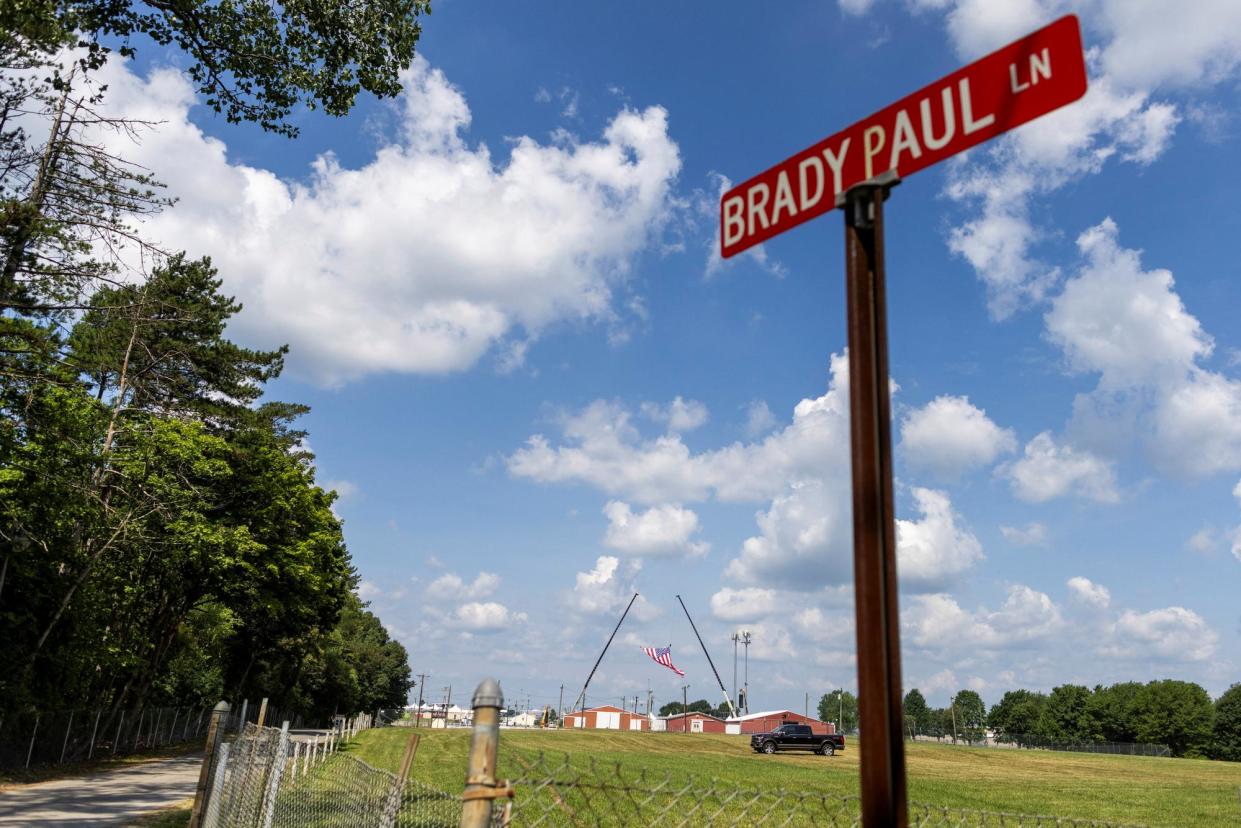Pennsylvania town reckons with Trump rally shooting: ‘The rhetoric has to stop’

Amid tight security and blocked-off roads, the small town of Butler, Pennsylvania, was attempting to come to terms with becoming the site of a major attempted US political assassination on Sunday.
Many went to church to make sense of events. At one, Father Kevin Fazio called on the congregation packed into pews to “pray for our nation”, but most of his flock seemed subdued by the violence that had come to town.
Less than a quarter of a mile away, the Butler Farm Show fairgrounds remains a crime scene, the gantries that hang massive stars and stripes and concert-sized speakers over Donald Trump’s rallies still erect, and the roof of AGR Industries, from where a gunman took aim at the former president, was clearly visible.
Many inhabitants of Butler said they were deeply shaken. A farming town 20 miles north of Pittsburgh is typical of rural Trump country. Farms are being sold off for new housing developments, but the roads into town are still dotted with farm stands and signs urging Christian values: “In a world where you can be anything – be kind,” read one.
But Butler is now a marker of America’s periodic turns to political violence.
Trump’s rallies have long been carnivals, part politics and an expression of shared rightwing values and entertainment. That changed on Saturday evening, when shots rang out. The former US president reached to his ear, ducked behind the podium and was engulfed by a scrum of Secret Service agents, only to emerge seconds later, bloodied, with his fist in the air and mouthing: “Fight! Fight!”
Outside a Sunoco gas station near the fairgrounds, an older man come for coffee and a breakfast sandwich and said he believed his son-in-law Greg Smith – the man who described seeing the shooter doing a bear-crawl along the rooftop, rifle in hand, to the BBC – had saved Trump’s life.
“He was yelling at the shooter, causing him to fire sooner and miss his mark while the police were doing nothing,” he said, recounting his experience as a deer hunter, where presence of mind was required to aim and fire accurately.
Another man at the store, who had been at the rally, said it was not the shooting itself that caused panic in the crowds, as many believed the gunshots were merely fire-crackers going off. But panic began to take hold when a section of the crowd, unaware of the shooting, pushed back on those at the front trying to flee.
“People were falling on top of each other,” he said. “The elders who fell couldn’t get up, the kids were screaming. My family is all shook up.”
Another man, Randy, said but it was a blessing that a summer heatwave had many kept people away from the fair and there hadn’t been a stampede. But the political temperature in the country, he said, had made it almost inevitable that “you’re going to get a crazy doing something crazy”.
“The rhetoric in this country is sad, it’s terrible. It has to stop,” he said.
The Pennsylvania governor, Josh Shapiro, a Democrat, travelled to Butler to express condolences for the family of Corey Comperatore, former fire-chief a nearby township, who was killed in the shooting as he tried to protect his daughters from the gunfire.
Shapiro called on Americans to “be firm” and to “advocate for” their beliefs but peacefully. “Every day when I’m out in Pennsylvania, I see the best of Pennsylvanians,” he said. “Those who love their neighbors even if they have differences.”
Richard Goldinger, district attorney of Butler county, told the Pittsburgh Post-Gazette that “it’s embarrassing that this would happen here. This hasn’t happened in more than 40 years – to have an attempt on a president’s life.”
Others pointed to the security failings ahead of Trump’s appearance on stage. Evan, a young man who said he was not a Trump supporter, said security at the fairgrounds had been talked about in the town for days before the event – particularly the vulnerability of the surrounding buildings.
“The Secret Service dropped the ball big time,” he said.
Bobbie Barbary, passing though from South Bend, Indiana, had another perspective: “America has a disease – resentment, hatred and racism,” he said.
Butler may mark an end to the freewheeling Trump roadshow and his campaign rallies will need to be reined in for his safety and that of others. But that’s not how it looked 12 hours earlier, when the Butler Eagle newspaper predicted Trump’s campaign stop was “an opportunity to put a small town on the map in a contentious presidential election”.
By coming to Butler, the paper said, the rally – two days before the Republican convention kicks off in Milwaukee – would be a return to a different, older style of campaigning of going to where the voters are, in this case a farm show, that focused on increasing support among undecided people that Trump needs to carry the state in November.
But for some in the wake of the shooting, Saturday’s events were now a sign that some aspects of modern American political life were better kept at a distance. The suspected shooter, from an affluent neighborhood just 30 miles (48km) away, had brought not only a rifle to kill Trump but explosives too were found in his car and his home.
Yet an exact motive remains a mystery. Crooks was both a registered Republican and a very minor donor to a progressive cause. His social media footprint was negligible and betrayed little of his beliefs.
“It’s America,” said a checkout worker at the town farmers’ market. “All kinds of crazy people out there.”
